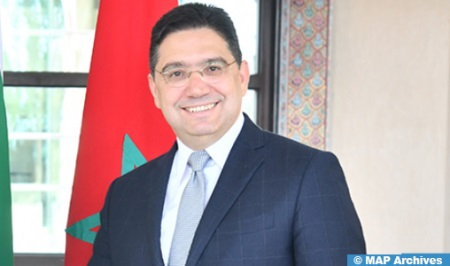AU Summit: Peace, Security and Development Go Hand in Hand, Says Moroccan FM
Peace, security and development go hand in hand, hence the importance of a holistic, integrated and multidimensional approach, based on a close overlap between these three dimensions, said Minister of Foreign Affairs, African Cooperation and Moroccan Expatriates, Nasser Bourita, who is representing HM King Mohammed VI at the 37th African Union Summit being held Saturday and Sunday in Addis Ababa. “Also, it is necessary to recognize the value of discussion platforms on this overlap,” noted Bourita, emphasizing in this regard that the processes of Tangier, Aswan, Dakar, Luanda and Lomé form a hub of ideas, and fruition of such an approach where development stands as the first bulwark against instability and insecurity, aligned with the ten-year plan of Agenda 2063. “While we are halfway to implementing the 2030 Silencing the Guns in Africa strategy, the continued emergence of areas of tension raises pressing questions. In 2030, our assessment must be positive, but this momentum for success will undoubtedly depend on our ability to weave a resilient network of peace within the continent, stressed the Minister during the examination of point 2c1 on the report of the AU Peace and Security Council (PSC) on its activities and on the state of peace and security in Africa (January-December 2023). Bourita pointed out that “only 6 years separate us from the 2030 horizon, and it is essential that the 2nd ten-year plan of Agenda 2063 be rigorously implemented”. The Minister noted that despite the various challenges linked “to our institutional capacity, the PSC remains actively involved in all issues relating to peace and security on the Continent”. Referring to the AU’s PSC report, Bourita said that over the course of 2023, the PSC had demonstrated positive dynamism, holding a total of 61 meetings and producing 58 significant conclusions. These deliberations covered a wide range of subjects, from thematic issues to country- and region-specific situations, the Minister added, noting that activities carried out by the PSC during the period under review also included consultations with other AU bodies with which the PSC has complementary mandates, high-level seminars, retreats to review working methods, joint consultations notably with the UN Security Council, the UN Peacebuilding Commission and the EU Political and Security Committee. In April 2023, the PSC initiated a new era of dialogue by holding informal consultations with countries in political transition, establishing a direct dialogue to better understand the particular challenges of these countries, while offering suggestions for improved PSC action, Bourita added. The PSC organized a meeting with president of the Union of the Comoros, Azali Assoumani, in his capacity as chairman of the African Union. The main objective of this meeting was to deepen reflection on the state of governance, peace and security on the continent, in particular political transitions, developments in the Horn of Africa, the Great Lakes and the Sahel, the Minister emphasized. Furthermore, and in addition to the security aspect, the PSC’s activities during 2023 included fundamental aspects of African action to strengthen political and democratic governance in Africa, reaffirmed Bourita, citing the PSC’s exchange with the Sub-Committee of the Permanent Representatives Committee (COREP) on Human Rights, Democracy and Governance, the holding of the 2nd training cycle for election observers, in Rabat, in May 2023, the training of African women on transitional justice, held in Nairobi, in August 2023, and the 7th African Forum on Transitional Justice, in Rabat, in September 2023, are all activities that fall within this same niche. The current situation in Africa gives cause for legitimate concern, characterized by persistent security challenges, often of an asymmetrical nature, noted the Minister, adding that no region in Africa today is spared from sources of instability. In addition to traditional challenges, climate change, cybersecurity and food and health security issues are emerging as major challenges, adding further complexity to the situation in Africa, Bourita stressed, noting that this pattern of conflict facing Africa today persists at an alarming rate, highlighting the urgent need for a collective and coordinated response to preserve the peace, security, sovereignty and territorial integrity of states. Faced with this situation, there is an increasingly urgent need to strengthen the early warning system and conflict prevention, including through preventive diplomacy and mediation, according to the Minister. Bourita recalled that the recent UN Security Council resolution, which reiterated the Council’s primary responsibility for the maintenance of international peace and security, enshrined access to UN assessed contributions for the financing of AU peace support operations (PSOs), marking a significant step towards a strong Africa in control of its own destiny. This resolution, said the Minister, does not come without its share of challenges: it also creates an additional burden, namely to define exactly the proportion of resources to be mobilized in a spirit of responsibility and solidarity. This undertaking also requires better coordination and synergies between the AU, the UN Security Council and Africa’s partners, on the one hand, and between the AU and the Regional Economic Communities, on the other, the Minister stressed.

